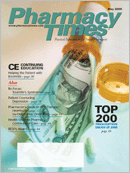Publication
Article
Pharmacy Times
EMSAM (selegiline transdermal system)?Bristol-Myers Squibb Co and Somerset Pharmaceuticals Inc
Author(s):
The FDA has approved EMSAM (selegiline transdermal system), a monoamine oxidase inhibitor (MAOI) and the first transdermal therapy for the treatment of major depressive disorder in adults. The transdermal system offers a unique treatment for patients by delivering medication continuously to the bloodstream, with minimal exposure to the gastrointestinal (GI) system.
EMSAM is marketed by Bristol-Myers Squibb Co and manufactured by Somerset Pharmaceuticals Inc. It is available in 3 strengths: 6 mg/24 hr, 9 mg/24 hr, and 12 mg/24 hr.1
Mechanism of Action
Monoamine oxidase exists as 2 isoforms, MAO-A and MAO-B. Selegiline has greater affinity for MAO-B but at antidepressant doses inhibits both isoenzymes. Although the exact mechanism is not fully understood, the inhibition of both MAO-A and MAO-B is believed to potentiate activity of monoamine transmitters in the brain such as serotonin, norepinephrine, and dopamine.
Tyramine Dietary Modifications
As demonstrated in animal models, EMSAM 6 mg/24 hr allows for antidepressant concentrations of selegiline to be achieved in the brain while preserving adequate MAO-A in the GI tract to break down tyramine. Thus there are no dietary restrictions at the starting and target doses of 6 mg/24 hr.
Due to limited data for EMSAM 9 mg/24 hr and 12 mg/24 hr, to reduce the risk of hypertensive crisis, dietary tyramine modifications are required at these doses. Patients using the 9-mg/24-hr and the 12-mg/24-hr patches must follow dietary tyramine modification beginning the first day of treatment with these doses and for 2 weeks after discontinuing the patches or reducing the dose to 6mg/24 hr. Examples of foods and drinks to avoid include meat, poultry, or fish that has been aged, fermented, spoiled, pickled, or improperly stored; broad bean pods; aged cheeses; tap or unpasteurized beers; concentrated yeast extracts; sauerkraut; soy products; and OTC tyramine products.2
Clinical Trials
Two double-blind, placebo-controlled studies evaluated EMSAM in ambulatory adults. In the first trial, 176 patients were treated with EMSAM or placebo for 6 weeks. The patients using EMSAM 6 mg/24 hr showed a significant improvement, compared with those on placebo.
The second trial was 8 weeks in duration and included 265 patients. Dosage increases to the 9-mg/24-hr or the 12-mg/24-hr patch were made based on protocol criteria. In this 8-week, flexibledose trial, patients using EMSAM were shown to have a significant improvement in their depressive symptoms, when compared with those on placebo.1
The most common side effect during clinical trials was skin irritation at the site of application.
Contraindicated Drugs
EMSAM is contraindicated with selective serotonin reuptake inhibitors, dual serotonin and norepinephrine reuptake inhibitors, tricyclic antidepressants, MAOIs, mirtazapine, bupropion, meperidine, tramadol, methadone, propoxyphene, pentazocine, dextromethorphan, cyclobenzaprine, oral selegiline, carbamazepine, oxcarbazepine, St. John's wort, and sympathomimetic amines (amphetamines and cold products as well as weight-control products containing vasoconstrictors), and some of these medicines require at least 1 week washout between discontinuing therapy and beginning EMSAM. This washout period should be lengthened to 5 weeks in patients using fluoxetine. Additionally, at least 2 weeks should pass between discontinuing EMSAM and beginning any contraindicated drug or buspirone.1
Other Contraindications and Warnings
Localized anesthesia containing vasoconstrictors or general anesthesia for elective surgery is contraindicated in patients using EMSAM. EMSAM is contraindicated in patients with pheochromocytoma.2
Increased suicidality has been associated with children and adolescents who are taking antidepressants. EMSAM is not approved for use in pediatric patients.2 EMSAM is not approved for bipolar disorder; this diagnosis should be ruled out before initiating treatment with EMSAM. Concomitant use with buspirone should be avoided while using EMSAM, and the appropriate washout periods should be followed. Alcohol use also should be avoided.1
Dr. Holmberg is a pharmacist with Phoenix Children's Hospital, Phoenix, Ariz.
For a list of references, send a stamped, self-addressed envelope to: References Department, Attn. A. Stahl, Pharmacy Times, 241 Forsgate Drive, Jamesburg, NJ 08831; or send an e-mail request to: [email protected].

Newsletter
Stay informed on drug updates, treatment guidelines, and pharmacy practice trends—subscribe to Pharmacy Times for weekly clinical insights.






